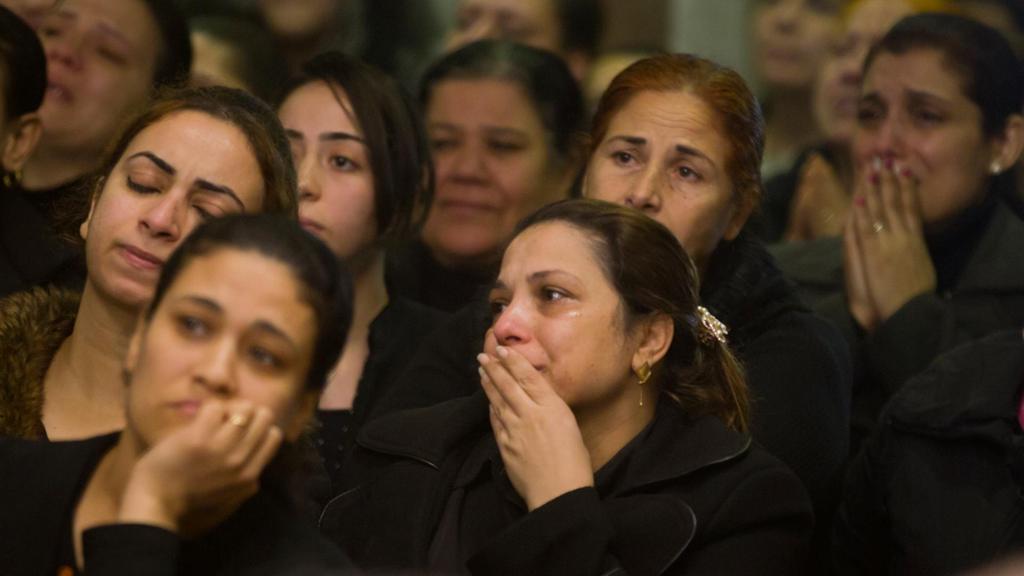الإعتداء على الكنيسة في مصر يحتاج إلى ردة فعل من المجتمع المني المقوي والفاعل
Egypt church attack requires a broad response from an empowered civil society
HA Hellyer/The National/December 30/17
Extremists have claimed responsibility, writes HA Hellyer, but the attack raises wider questions
https://www.thenational.ae/opinion/egypt-church-attack-requires-a-broad-response-from-an-empowered-civil-society-1.691524
For many Christian communities of the West, Christmas has come and gone. For Christian Egyptian communities, the season is only beginning, as the Coptic Orthodox calendar marks Christmas on January 7. Alas, the period has already been marred. On Friday, a church of the community was attacked by radicals, resulting in around a dozen fatalities. The scourge of sectarian violence remains in Egypt and it must be addressed.
ISIL has claimed responsibility for the vile attack, which took place upon Christians as they were at their place of prayer and upon Muslim security officials who gave their lives to protect their compatriots. The modus operandi bears the hallmarks of ISIL militants, who have targeted Christian Egyptians in their discourse as well as their acts. It is a common strategy of ISIL – the attempt to engender civil strife in order to provoke an internecine war between communities in Egypt. It is in such upheaval that ISIL and their cohorts hope to make gains, and thus they have targeted Christians and Muslim communities that they deem to have strayed from Islam. The atrocious attack on a mosque linked to a Sufi order in the north of Sinai last month was probably one example of the latter, though ISIL has yet to publicly take responsibility for it.
But it would be folly to limit responsibility for sectarian discourse to ISIL alone. Attacks like these predate the group. Sectarian incitement against Christians is all too commonplace in Egypt – radical and extremist Islamist cohorts dabble in it. It is a strange and vile discourse, one that incites against Christians, claiming they are collectively party to oppression in Egypt. And then, when attacks take place, the discourse denies culpability. Indeed, it invariably claims that such attacks are false flags, implying that murky elements in the state apparatus are responsible.
That is one element in the discussion that should be taken into consideration and when non-ISIL websites promote such incitement and sectarianism, they cannot be deemed to be remotely acceptable.
But there is more to be considered here. The Egyptian state cannot stop all terrorist activity in Egypt, any more than any other government can be expected to – such militant attacks are impossible to fully prevent – but actions can be taken, nonetheless, beyond a security response. That response has to uphold the highest standards, be it in Egypt, Europe or elsewhere, and where it does not, failings ought to be analysed and solutions implemented.
Sectarian acts and discourse are another linked matter. Christian groups have complained for years that in the aftermath of sectarian strife that is not carried out by militant groups like ISIL, accountability is insufficiently pursued. Infamous so-called reconciliation activities are pursued, which are not only lacking in transparency, but cease to provide Christian Egyptians under threat with sufficient protection. Such a flawed approach emboldens impunity and engenders an atmosphere where Christians justifiably feel vulnerable.
Clearly, there are structural issues here that officially, even the Egyptian state itself says ought to be addressed. In a recent interview, a senior Egyptian official suggested a law criminalising “religious discrimination and the establishment of a national commission for combating discrimination”. Yet, other Egyptian figures in the parliament reprimanded the US Congress for raising the issue of Christian Egyptians.
All too often the issue of Christian Egyptians is raised internationally in a splintered manner, rather than in the promotion of citizenship and rights for all Egyptians. The former is not an approach that helps the long-term benefit of Christians in particular and Egyptians in general. The latter is far more preferable.
At the same time, it has to be recognised that Christian Egyptians face particular and distinct challenges – and the denial of that specific type of vulnerability comes with a cost. At a time when extremist sectarian discourse is promoted by different non-state actors with violent consequences, any type of denial of sectarianism encourages its perpetuation, and holds back the addressing of it with due seriousness.
The temptation is to criticise the Muslim religious establishment in Egypt for not doing enough to combat sectarianism, thus implying that the religious establishment implicitly supports sectarianism. That kind of framing is incorrect. The key problem in Egypt is not that the religious establishment supports sectarianism, it is that the establishment is ill-equipped. The higher leadership of the Azhar, for example, is very sympathetic to Sufism, as a mainstream religious science – but has been unable to stamp out the notion that Sufism is heretical. Empowering the religious establishment to put forward a more inclusive, mainstream approach is thus essential – but it would mean empowering its independence as well, which would mean the authorities more generally would become subjects of criticism as well. All of that is necessary to ensure that the curricula of the religious establishment is raised in terms of quality and standard. To carry out the alternative, which some are calling for, of simply dictating what the religious establishment says, would simply destroy its credibility even further, leaving more problems than exist at present.
After attacks such as these, the instinct is to focus solely on security solutions. Security solutions are, of course, important – the attackers are violent extremists – but there are wider issues that ought to be addressed. The discourse requires a wider response, from an empowered civil society. The seriousness of the scourge of sectarianism must be a top priority, as its importance cannot be overstated.




















